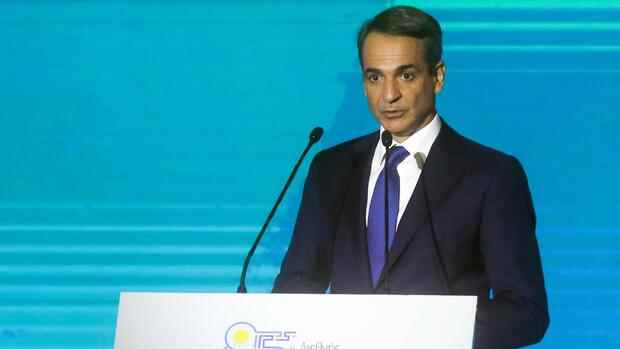Athens Greece is recovering from the economic fallout from the pandemic faster than expected. But the Conservative government’s economic track record is overshadowed by the forest fire disasters this summer. Prime Minister Kyriakos Mitsotakis had to admit mistakes and failures in disaster management. The Prime Minister now wants to give his government new impetus with a “National Action Plan”.
Every year in September, the international trade fair in Thessaloniki in northern Greece provides the framework for an economic policy keynote speech by the respective heads of government. A good two years after his election, Prime Minister Mitsotakis used the opening event on Saturday evening as a stage for a new signal of departure. Mitsotakis came to Thessaloniki with good news.
Last week, the state statistical office in Elstat reported economic growth of 16.4 percent for the second quarter compared to the same quarter of the previous year. Greece has thus already exceeded the level of mid-2019 in terms of gross domestic product (GDP). The upswing is solid; it is mainly based on increasing investments and higher export earnings.
After the government had previously forecast growth of 3.6 percent for 2021, Mitsotakis is now assuming 5.9 percent. In 2022, the government even expects an increase of 6.2 percent. Greece is “at the beginning of a major upswing cycle,” said Mitsotakis. “The big challenge is that this will be an upswing for everyone.”
Top jobs of the day
Find the best jobs now and
be notified by email.
The stronger growth gives the government more fiscal space. Mitsotakis wants to use it for targeted tax cuts and social benefits. From 2022 corporate profits will only be taxed at 22 percent instead of 24 percent. The government subsidizes mergers and acquisitions of small and medium-sized companies with a 30 percent tax rebate. The social security contributions decrease by 1.1 percentage points.
Measures will probably cost 3.4 billion euros
The premier also announced that it would ease real estate taxes. The government supports the employment of young people between the ages of 18 and 29 who are taking up employment for the first six months with 1200 euros per month. Mitsotakis intends to provide grants for low-wage earners to cope with the steep rise in energy costs and to cushion inflation with lower consumption taxes.
The cost of the package of measures is estimated at 3.4 billion euros this year and next. The counter-financing is considered secured thanks to the higher economic growth. Especially since the government’s now upwardly revised GDP forecast may still be too conservative.
The German rating agency Scope expects growth of 8.6 percent this year. On Friday, Scope upgraded Greece’s credit rating from BB to BB +. This only separates the country one step from the league of investment-worthy debtors. Finance Minister Christos Staikouras sees the upgrade as “another vote of confidence” for Greece.
The government can use reports of success like this. Because 26 months after taking office, Mitsotakis, who was spoiled by success until recently, is feeling a headwind. This summer’s devastating fires destroyed over 100,000 hectares of forest and agricultural land.
The ecological damage is obvious. Hundreds of buildings burned down, thousands of people became homeless and lost their economic existence. The fire disaster was a severe political setback for the government. As a consequence of the inadequacies in fire fighting, Mitsotakis has now formed a new ministry for climate policy and civil protection.
The government’s pandemic management is controversial
But not everything is going smoothly in Corona crisis management either. After a well-organized start in spring, the corona vaccination campaign stalled. Only 64.2 percent of the adult population are fully vaccinated. This puts Greece well below the EU average of 70.6 percent.
From this Monday on, all unvaccinated employees in the private and public sectors have to be tested once a week in a laboratory at their own expense, teachers even every three days. Passengers are only allowed to use trains, intercity buses and planes if they have been vaccinated or have been tested. The government wants to persuade skeptics to get vaccinated after all.
In the health sector, vaccination has been mandatory since the beginning of September. Around 5,300 employees have already been released without payment because they refuse to be vaccinated. But the government’s hard line is controversial. In a survey last week, 63 percent of those surveyed said they were dissatisfied with the pandemic crisis management. For comparison: a year ago, the government received 60 percent approval for its corona policy.
The left opposition leader Alexis Tsipras already smells morning air. He doesn’t think Mitsotakis will see the full legislature until July 2023. “The decline of the government will accelerate,” Tsipras now predicted in a TV interview, “your time is running out”.
Tsipras expects new elections in spring 2022 and hopes to return to power. The polls do not suggest this. The opinion polls are registering growing dissatisfaction with the government’s crisis management, but on the Sunday issue, the conservative Nea Dimokratia is still around ten percentage points ahead of the left-wing alliance Syriza. In a personal comparison, the gap is even greater: 43 percent of those surveyed consider Mitsotakis to be the more suitable prime minister. Tsipras only trust 27 percent of this office.
More: The end of the Merkel era slows down EU expansion to include the Western Balkans.
.
